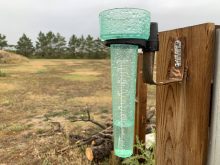A scrapie outbreak that hit Alberta and Saskatchewan sheep flocks this spring underlines the need for a national plan to eradicate the brain wasting disease, says one of the affected producers.
Beverly Davis, a cattle and sheep producer from Lashburn, Sask., who was one of 10 producers affected by the outbreak, said she is already using a plan that the Canadian Food Inspection Agency is expected to introduce next spring.
She said it involves using only rams that are resistant to the scrapie prion, and would bring sheep-rearing practices in line with those in the United States and Europe.
Read Also

Saskatchewan firm aims to fix soil with compost pellets
In his business, Humaterra, Leon Pratchler is helping farmers maximize yields in the weakest areas of their fields through the use of a compost pellet.
“If everyone used double R rams, there’d be no more scrapie within five years,” Davis said. “The sheep breeders had better get on the ball.”
CFIA contacted Davis after a ewe died of scrapie in March on an Alberta farm. The agency traced the animal back to 10 farms in Ontario, British Columbia and Saskatchewan.
Two ewes, which Davis had bought at a dispersal sale in Lloydminster in June 2002, were removed from her farm in April. One tested positive for scrapie. Last month, 26 sheep and 30 goats from Davis’s farm were ordered destroyed.
Sandra Stephens, CFIA’s veterinary program officer in disease control, said suspect animals have been quarantined on their farms pending further investigation. She said scrapie is a reportable disease that shows up in flocks every year in Canada.
“We’ve had a lot of experience with scrapie and there’s never been a link between scrapie and human illness.”
The animals usually die within two to six weeks of showing clinical signs, which include itchiness and an abnormal gait. It is one of a number of diseases classified as transmissible spongiform encephalopathies, which includes bovine spongiform encephalopathy, or BSE, in cattle.
CFIA reimburses producers up to $600 for each sheep ordered des-troyed, Stephens added.














